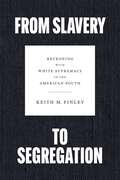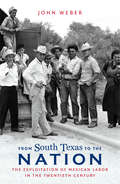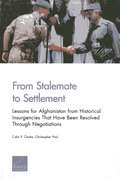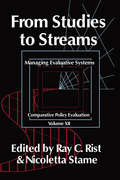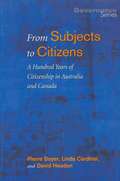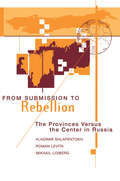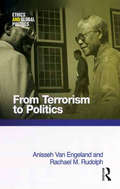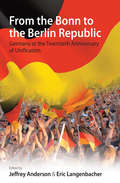- Table View
- List View
From Slavery to Segregation: Reckoning with White Supremacy in the American South
by Keith M. FinleyKeith M. Finley’s From Slavery to Segregation explores the key features shaping southern politics during the nineteenth and twentieth centuries as explained in the South’s defense of its racial systems. It treats slavery and segregation as part of the same whole rather than as discrete institutions rooted in different periods. In the process, the book uncovers the deep historical origins of the region’s states’ rights philosophy and the unfortunate persistence of a culture dominated by calls for white supremacy. While highlighting the broad overview of southern racial and political thought, Finley underscores the larger American struggle with racial injustice, which, although most pronounced in the South, afflicted the entire nation. The South’s defense of chattel slavery became a natural model for the region’s defense of segregation during the Jim Crow era. Through a comparative analysis of the rhetoric employed in the justification of both racial institutions, Finley reveals elements of continuity and change in the region’s identity. Ultimately, he shows how the history of the twentieth-century South is irreparably linked to the century before it. For instance, one cannot understand the ferocity of resistance to the Supreme Court’s 1954 Brown v. Board decision without being aware of how and why the South emerged as it did after the Civil War. The Old South and the New South shared a similar constellation of ideas that informed arguments advancing their respective race-based social orders, which took the form of a commonality of perception regarding race, a sense of being assailed by outsiders, and a series of appeals to the highest secular authority in the pantheon of regional and American beliefs—the Constitution. Discontinuity, however, marked the long-term strategies of both the prewar and postwar South. Although segregationists sought to preserve the racial status quo as did their forebears, they ultimately relented when confronted with federal power and grudgingly shifted toward a narrative that less often foregrounded race when championing states’ rights.
From Slavery to the Cooperative Commonwealth
by Alex GourevitchThis book reconstructs how a group of nineteenth-century labor reformers appropriated and radicalized the republican tradition. These "labor republicans" derived their definition of freedom from a long tradition of political theory dating back to the classical republics. In this tradition, to be free is to be independent of anyone else's will - to be dependent is to be a slave. Borrowing these ideas, labor republicans argued that wage laborers were unfree because of their abject dependence on their employers. Workers in a cooperative, on the other hand, were considered free because they equally and collectively controlled their work. Although these labor republicans are relatively unknown, this book details their unique, contemporary, and valuable perspective on both American history and the organization of the economy.
From Social Visibility to Political Invisibility: The School in Nationalist Taiwan as Fulcrum for an Evolving World Ethos
by Allen ChunThis book began as a year-long ethnography of a school in Taiwan in 1991 then evolved more into a historical sociology of national formation and its cultural mindset. Cultural nationalism is a widely debated but poorly understood process. Contrary to prevailing perceptions, the Cold War may have given way to a more progressive open society, but the politicization of ethnicity hardened a more deeply entrenched cultural frame of mind. Instead of liberating an indigenous reality, Taiwanese consciousness has ironically polarized the political dead ends of reunification and independence. In the final analysis, the ethnography can serve as a paradigmatic case study for critical cultural studies. There are clear ramifications also for a comparative study of the cultural politics of other Chinese speaking or Asian societies and their histories.
From Soldiers to Citizens: Demilitarization of Conflict and Society (Iss Monograph Ser. #No. 130)
by Chris Alden João Gomes PortoDemilitarization of conflict and society is crucial to building sustainable peace in countries emerging from the scourge of civil war. As longstanding conflicts come to an end, processes which facilitate the potentially volatile transition from formal peace to social peace are critically important. At the heart of the exercise is the necessity of transforming the culture and the instruments of war - demilitarization - including disarming, demobilizing and reintegrating (DDR) former combatants into society. This volume represents the first in-depth and comprehensive discussion of reintegration of former combatants in war to peace transitions. In addition to a systematic reflection and review of existing literature on DDR, the authors devised and applied a field research methodology to studying the reintegration of former combatants in Angola with potentially significant implications on the design and implementation of DDR programmes. The volume is written for academics, students and practitioners focusing on war to peace transitions and post-conflict issues.
From Solidarity to Geopolitics
by Tsveta PetrovaThis book theorizes a mechanism underlying regime-change waves, the deliberate efforts of diffusion entrepreneurs to spread a particular regime and regime-change model across state borders. Why do only certain states and nonstate actors emerge as such entrepreneurs? Why, how, and how effectively do they support regime change abroad? To answer these questions, the book studies the entrepreneurs behind the third wave of democratization, with a focus on the new eastern European democracies - members of the European Union. The study finds that it is not the strongest democracies nor the democracies trying to ensure their survival in a neighborhood of nondemocracies that become the most active diffusion entrepreneurs. It is, instead, the countries where the organizers of the domestic democratic transitions build strong solidarity movements supporting the spread of democracy abroad that do. The book also draws parallels between their activism abroad and their experiences with democratization and democracy assistance at home.
From South Texas to the Nation: The Exploitation of Mexican Labor in the Twentieth Century (The David J. Weber Series in the New Borderlands History)
by John WeberIn the early years of the twentieth century, newcomer farmers and migrant Mexicans forged a new world in South Texas. In just a decade, this vast region, previously considered too isolated and desolate for large-scale agriculture, became one of the United States' most lucrative farming regions and one of its worst places to work. By encouraging mass migration from Mexico, paying low wages, selectively enforcing immigration restrictions, toppling older political arrangements, and periodically immobilizing the workforce, growers created a system of labor controls unique in its levels of exploitation.Ethnic Mexican residents of South Texas fought back by organizing and by leaving, migrating to destinations around the United States where employers eagerly hired them--and continued to exploit them. In From South Texas to the Nation, John Weber reinterprets the United States' record on human and labor rights. This important book illuminates the way in which South Texas pioneered the low-wage, insecure, migration-dependent labor system on which so many industries continue to depend.
From Splendor to Revolution: The Romanov Women 1847–1928
by Julia P. Gelardi“A richly detailed portrait of four women, whom marriage and blood put at the center of European history.” —Richmond Times-DispatchThis sweeping saga recreates the extraordinary opulence and violence of Tsarist Russia as the shadow of revolution fell over the land and destroyed a way of life for these Imperial women.From the early 1850s until the late 1920s Russia underwent a massive transformation, taking it from days of grandeur under the tsars to the chaos of revolution and the beginnings of the Soviet Union.At the center of all this tumult were four Romanov women. Marie Alexandrovna, Tsar Alexander II’s pampered daughter, astonished her mother-in-law, Queen Victoria, with her strength of character. Thrust into the role of queen at sixteen, Olga Constantinovna’s altruistic streak benefited Greeks and Russians alike. Charming and vivacious, Marie Feodorovna, the mother of the ill-fated Tsar Nicholas II, excelled in her role as empress. Formidable and ambitious, Marie Pavlovna emerged as a rival to Tsarina Alexandra, Nicholas II’s embattled consort.From Splendor to Revolution presents the unforgettable political and personal dramas of these extraordinary women. What began for them as a time of splendor ended after World War I, with a Russia destroyed by revolution.“Relating the drama and tragedy of royal life, Gelardi ably weaves in the extended family ties that connected most European rulers, including Queen Victoria.” —Publishers Weekly (starred review)“Simple, straightforward, and engaging. Gelardi is proof that history written from the female perspective can be all business.” —The Roanoke Times
From Stalemate to Settlement: Lessons for Afghanistan from Historical Insurgencies That Have Been Resolved Through Negotiations
by Christopher Paul Colin P. ClarkeA comprehensive review of historical insurgencies that ended in settlement after a military stalemate shows that these negotiations followed a similar path that can be generalized into a "master narrative" of seven steps executed in a common sequence. Such a narrative could help guide and assess the progress of a similar approach to resolving the conflict in Afghanistan as U. S. forces prepare to withdraw.
From Stalemate to Settlement: Lessons for Afghanistan from Historical Insurgencies That Have Been Resolved Through Negotiations
by Christopher Paul Colin P. ClarkeA comprehensive review of historical insurgencies that ended in settlement after a military stalemate shows that these negotiations followed a similar path that can be generalized into a "master narrative" of seven steps executed in a common sequence. Such a narrative could help guide and assess the progress of a similar approach to resolving the conflict in Afghanistan as U. S. forces prepare to withdraw.
From Stalin to Mao: Albania and the Socialist World
by Elidor MëhilliElidor Mëhilli has produced a groundbreaking history of communist Albania that illuminates one of Europe’s longest but least understood dictatorships. From Stalin to Mao, which is informed throughout by Mëhilli’s unprecedented access to previously restricted archives, captures the powerful globalism of post-1945 socialism, as well as the unintended consequences of cross-border exchanges from the Mediterranean to East Asia. After a decade of vigorous borrowing from the Soviet Union—advisers, factories, school textbooks, urban plans—Albania’s party clique switched allegiance to China during the 1960s Sino-Soviet conflict, seeing in Mao’s patronage an opportunity to keep Stalinism alive. Mëhilli shows how socialism created a shared transnational material and mental culture—still evident today around Eurasia—but it failed to generate political unity. Combining an analysis of ideology with a sharp sense of geopolitics, he brings into view Fascist Italy’s involvement in Albania, then explores the country’s Eastern bloc entanglements, the profound fascination with the Soviets, and the contradictions of the dramatic anti-Soviet turn. Richly illustrated with never-before-published photographs, From Stalin to Mao draws on a wealth of Albanian, Russian, German, British, Italian, Czech, and American archival sources, in addition to fiction, interviews, and memoirs. Mëhilli’s fresh perspective on the Soviet-Chinese battle for the soul of revolution in the global Cold War also illuminates the paradoxes of state planning in the twentieth century.
From Stalinism to Eurocommunism: The Bitter Fruits of 'Socialism in One Country'
by Ernest MandelErnest Mandel's book is a study of Eurocommunism unlike any other. Written in the polemical tradition of Trotsky, its sweep extends well beyond the immediate prospects of the Communist Parties of Western Europe. Mandel traces the long historical process which has transformed the once embattled detachments of the Third International into the constitutionalist formations of "historic compromise" and "union of the people" today. He then goes on to argue that the national roads to socialism of contemporary Eurocommunism are the "bitter fruits of socialism in one country" in the USSR. Mandel's book contains trenchant and documented criticisms of the ideas of Santiago Carrillo in Spain, the economic policies of the PCI in Italy, and the PCF's theories of the State in France. But it also sets these Western developments in the context of European politics as a whole--discussing the Russian response to Carrillo, the organizational attitudes of the CPSU to the Western parties, and the emergence of major dissident currents in Eastern Germany sympathetic to Eurocommunism. From Stalinism to Eurocommunism represents the first systematic and comprehensive critique from the Marxist Left of the new strategy of Western Communism. It can be read as a barometer of the storms ahead in the European labour movement.
From Statism To Pluralism: Democracy, Civil Society And Global Politics
by Hirst, Paul Paul Hirst Professor of Social Theory, Birkbeck College, London.Modern societies currently lack positive alternative visions of the future. Many writers have claimed that the only option is a return to free-market capitalism, in which success and survival depend on being as competitive as possible whether as a nation, firm or individual.; Paul Hirst argues that there are viable alternative futures and widely applicable models that can be used to structure change. Hirst's distinctive approach to political theory reasons from real political problems rather than confining itself to abstract concepts.; Presenting an innovative political position, this collection of essays represents an attempt to re- state a practical third way between the discredited ideals of state socialism and laissez-faire capitalism.
From Steel to Slots: Casino Capitalism in the Postindustrial City
by Chloe E. TaftBethlehem PA was synonymous with steel. But after the factories closed, the city bet its future on casino gambling. Chloe Taft describes a city struggling to make sense of the ways global capitalism transforms jobs, landscapes, and identities. While residents often have few cards to play, the shape economic progress takes is not inevitable.
From Stimulus to Consolidation: Revenue and Expenditure Policies in Advanced and Emerging Economies
by Benedict Clements Victoria Perry Juan ToroA staff team of the International Monetary Fund's Fiscal Affairs Department offers member countries a strategy for fiscal adjustment that can help support sustainable growth over the longer term. On the spending side, they suggest stabilizing pension and public health spending ratios to gross domestic product and reducing other outlays such as public wages, untargeted social spending, and subsidies. On the revenue side, they suggest reducing existing distortions in the tax system. There is no index. Annotation ©2011 Book News, Inc. , Portland, OR (booknews. com)
From Stress to Growth: Strengthening Asia's Financial Systems in a Post-Crisis World
by Marcus Noland Donghyun ParkAsian financial systems, which serve the most economically dynamic region of the world, survived the global economic crisis of the last several years. In From Stress to Growth: Strengthening Asia's Financial Systems in a Post-Crisis World, scholars affiliated with the Peterson Institute for International Economics and the Asian Development Bank argue in separate essays that Asian systems must strengthen their quality, diversity, and resilience to future shocks in order to deliver growth in coming years. The book examines such phenomena as the dominance of state-owned banks, the growth of nonbank lending (the so-called shadow banks), and the need to develop local bond markets, new financial centers, and stronger supervisory tools to prevent dangerous real estate asset bubbles. China's large financial system is discussed at length, with emphasis on concerns that China's system has grown too fast, that it is overly tilted toward corporate borrowing, and that state domination has led to overly easy credit to state-owned actors. Asia needs investment to improve its infrastructure and carry out technological innovation, but the book argues that the region's financial systems face challenges in meeting that need.
From Student to Urban Planner: Young Practitioners’ Reflections on Contemporary Ethical Challenges (RTPI Library Series)
by Tuna Taşan-Kok Mark OranjeFor many young planners, the noble intentions with going to planning school seem starkly out of place in the neoliberal worlds they have come to inhabit. For some, the huge gap between the power they thought they would have and what they actually do is not only worrying, but also deeply discouraging. But for some others, practice means finding practical and creative solutions to overcome challenges and complexities. How do young planners in different settings respond to seemingly similar situations like these? What do they do – give up, adjust, or fight back? What role did their planning education play, and could it have helped in preparing and assisting them to respond to the world they are encountering? In this edited volume, stories of young planners from sixteen countries that engage these questions are presented. The sixteen cases range from settings with older, established planning systems (e.g., USA, the Netherlands, and the UK) to settings where the system is less set (e.g., Brazil), being remodeled (e.g., South Africa and Bosnia Herzegovina), and under stress (e.g., Turkey and Poland). Each chapter explores what might be done differently to prepare young planners for the complexities and challenges of their ‘real worlds’. This book not only points out what is absent, but also offers planning educators an alternative vision. The editors and esteemed contributors provide reflections and suggestions as to how this new generation of young planners can be supported to survive in, embrace, and change the world they are encountering, and, in the spirit of planning, endeavor to ‘change it for the better’.
From Studies to Streams: Managing Evaluative Systems (Comparative Policy Evaluation Ser. #Vol. 12)
by Nicoletta StameRecent developments in policy evaluation have focused on new notions of process and use or, notably, "influence." But this debate among evaluators on how evaluations are used has been essentially a closed one—evaluators talking only among themselves. The debate has gone on seemingly oblivious to fundamental changes in the intellectual landscape of public management, organizational theory, information technology, and knowledge management. New realities demand a different approach toward evaluation.The current era is characterized by the emergence of an increasingly global set of pressures for governments to perform effectively, not just efficiently, and to demonstrate that their performance is producing desired results. Information technology allows enormous quantities of information to be stored, sorted, analyzed, and made available at little or no cost. The result for those in the evaluation community is that, while individual evaluations are still conducted and reported upon, they are a rapidly diminishing source of information.In the new environment, ever accelerating political and organizational demands and expectations are reframing thinking about the definition of what, fundamentally, constitutes evaluation and what we understand as its applications. In this twelfth volume in the Comparative Policy Evaluation series, authors from fourteen nations address these issues from multiple vantage points. From Studies to Streams is an essential tool for policymakers, government officials, and scholars interested in the contemporary status of evaluation.
From Subjects to Citizens: A Hundred Years of Citizenship in Australia and Canada
by Pierre Boyer Linda Cardinal David HeadonAustralia and Canada are both lively, multicultural societies with British constitutional traditions. Historically, they have faced similar challenges in defining and sustaining citizenship that reach back into a common past.
From Submission to Rebellion: The Provinces Versus the Center in Russia
by Vladimir ShlapentokhWritten in the spirit of comparative and historical analysis, this book addresses the relationship between the center and its provinces—an important issue in any society—using Russia as a case study. The authors investigate the historical stages of Russia's past with a special focus on the postcommunist era, a time when the movement toward regional autonomy (regionalization) is extremely important as a molder of political and economic life. In addition, the book shows how historical traditions, on the one hand, and the new market economy and democratization, on the other, will shape the relationship between the center and provinces in the coming decades.Shlapentokh, Levita, and Loiberg direct their attention not only to factors which shape regionalization, but also to the effects of this process on many different facets of Russian life. They argue that regionalization in Russia, as well as in other countries, is a contradictory process that has both benefits and drawbacks for social and economic progress.The solid research foundation draws from a rich body of sources, including Russian periodicals, statistical yearbooks, work by Russian and Western authors, data gathered in nationwide surveys conducted specifically for this project, and insightful observations made by the authors during their numerous visits to various regions in Russia.
From Subsistence to Exchange and Other Essays (New Forum Books #32)
by Peter Tamas BauerPeter Bauer, a pioneer of development economics, is an incisive thinker whose work continues to influence fields from political science to history to anthropology. As Nobel Laureate Amartya Sen writes in the introduction to this book, "the originality, force, and extensive bearing of his writings have been quite astonishing." This collection of Bauer's essays reveals the full power and range of his thought as well as the central concern that underlies so much of his diverse work: the impact of people's conduct, their cultural institutions, and the policies of their governments on economic progress. The papers here cover pressing and controversial issues, including the process that transforms a subsistence economy into an exchange economy, the reputed correlation between poverty and population density, the alleged responsibility of the West for Third World poverty, the often counterproductive results of foreign aid, and the effects of egalitarian policies on individual freedoms. Bauer addresses these and other matters with clarity, verve, and wit, combining his deep understanding of economic theory and methodology with keen insights into human nature. The book is a penetrating account of how to develop a prosperous economy alongside a free and fair society and a stimulating introduction to the work of a man who has done so much to shape our modern understanding of developing economies and of the relationship of economics to the other social sciences. "This selection of essays will give readers a wonderful opportunity to learn about the rich world of cognizance and analysis erected by one of the great architects of political economy. I feel privileged to be able to offer this letter of invitation."--From the introduction by Amartya Sen, Nobel Laureate in economics
From Subsistence to Exchange and other Essays
by Peter BauerPeter Bauer, a pioneer of development economics, is an incisive thinker whose work continues to influence fields from political science to history to anthropology. As Nobel Laureate Amartya Sen writes in the introduction to this book, "the originality, force, and extensive bearing of his writings have been quite astonishing." This collection of Bauer's essays reveals the full power and range of his thought as well as the central concern that underlies so much of his diverse work: the impact of people's conduct, their cultural institutions, and the policies of their governments on economic progress. The papers here cover pressing and controversial issues, including the process that transforms a subsistence economy into an exchange economy, the reputed correlation between poverty and population density, the alleged responsibility of the West for Third World poverty, the often counterproductive results of foreign aid, and the effects of egalitarian policies on individual freedoms. Bauer addresses these and other matters with clarity, verve, and wit, combining his deep understanding of economic theory and methodology with keen insights into human nature. The book is a penetrating account of how to develop a prosperous economy alongside a free and fair society and a stimulating introduction to the work of a man who has done so much to shape our modern understanding of developing economies and of the relationship of economics to the other social sciences.
From Telecommunications Liberalization to Net Neutrality Rules: A Longitudinal Institutional Analysis of EU Communications Policy (Studien der NRW School of Governance)
by Simon P. RinasEU communications policy has massively changed due to both global competition on the ICT market and technological developments that led to the emergence of Internet technology. This book analyzes the structural and procedural transformation processes inside the EU legislative processes and concludes that EU communications policy struggles to reflect today's internet-enabled communications reality. It provides insights in the institutional conditions that maintained specific patterns of EU communications policy since the beginning of telecommunications regulation and concludes with an outlook on the technological and regulatory challenges ahead.
From Terrorism to Politics (Ethics and Global Politics)
by Anisseh Van Engeland Rachael M. RudolphHow do terrorists become politicians? This book embraces a series of comparative case studies in order to examine important issues regarding the relationship between terrorism and political processes. It identifies the characteristics necessary for the transition from a 'terrorist' organization to a political party and situates this within broader debates about substantive ethical concerns motivating the distinction between legitimate politics and illegitimate violence. The volume offers a presentation of how some terrorist groups see the world in which they live. It also provides an understanding of how established democracies such as the US react to the phenomenon of the terrorist-politician transition. This is a useful resource for students and scholars of international relations, political ethics and comparative politics.
From Terrorism to Television: Dynamics of Media, State, and Society in Pakistan
by Qaisar AbbasThis book unpacks the media dynamics within the socio-cultural, political, and economic context of Pakistan. It provides an in-depth, critical, and scholarly discussion of contemporary issues such as media, state, and democracy in Pakistan; freedom of expression in Pakistani journalism; Balochistan as a blind spot in mainstream newspapers; media control by state institutions; women and media discourses; TV talk shows and coverage of Kashmir; feminist narrative and media images of Malala Yousufzai and Mukhtaran Mai; jihad on screen; and Osama bin Laden’s death on screen, to understand the relation between media and terrorism. The book covers diverse media types including TV, radio, newspapers, print media, films, documentary, stage performance, and social media. Detailed, interdisciplinary, analytical, and with original perspectives from journalists as well as academics, this volume will be useful to scholars and researchers of media studies, Pakistan studies, politics and international affairs, military and terrorism studies, journalism and communication studies, and South Asian studies. It will also interest general readers, policy makers, and those interested in global journalism, mass media, and freedom of expression.
From The Bonn To The Berlin Republic
by Eric Langenbacher Jeffrey AndersonThe fall of the Berlin Wall and the unification of East and West Germany in 1989/90 were events of world-historical significance. The twentieth anniversary of this juncture represents an excellent opportunity to reflect upon the evolution of the new Berlin Republic. Given the on-going significance of the country for theory and concept-building in many disciplines, an in-depth examination of the case is essential. In this volume, unique in its focus on all aspects of contemporary Germany - culture, historiography, society, politics and the economy - top scholars offer their assessments of the country's performance in these and other areas and analyze the successes and continued challenges.
